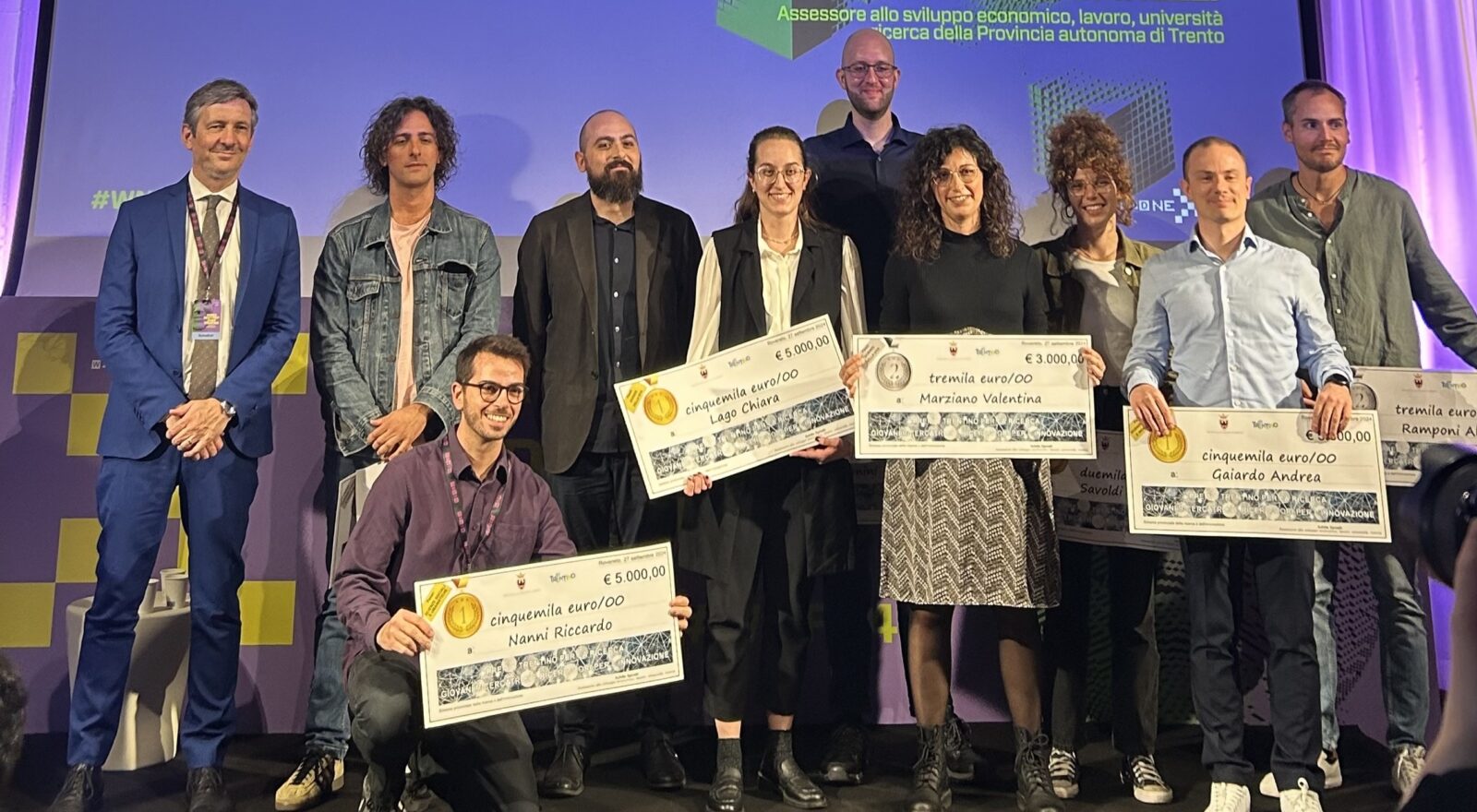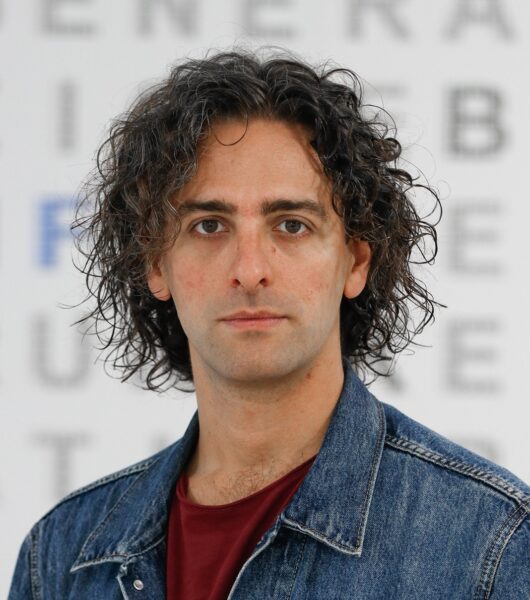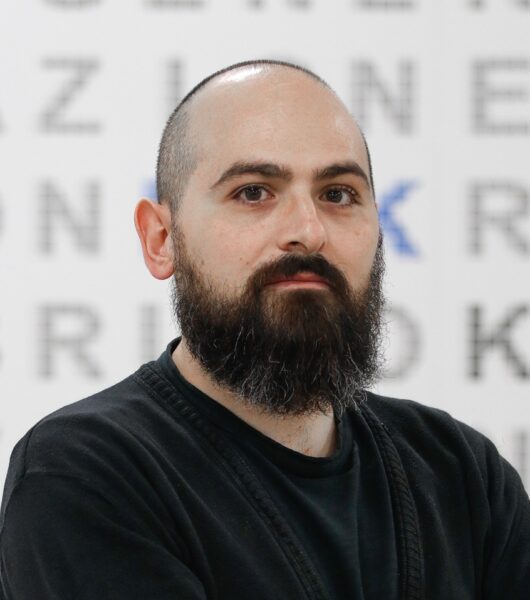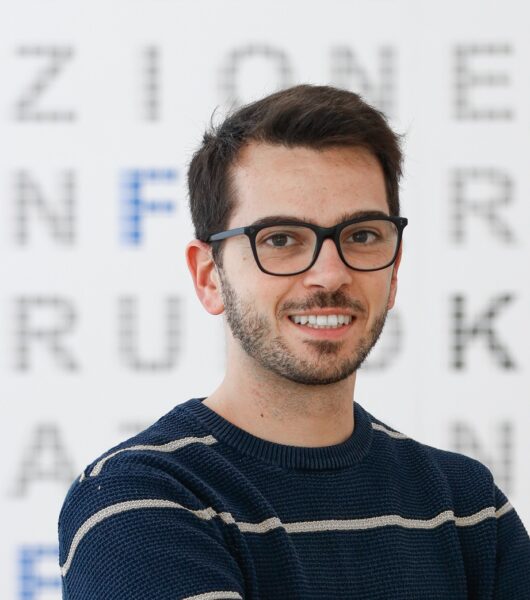Trentino per la Ricerca: eight innovation awards to young FBK researchers
The award to enhance the research and innovation work of young people in the Trentino region
During the Wired Next Fest Trentino, underway these days in Rovereto, the winners of the “Trentino Prize for Research – Young Female Researchers 2024” were also revealed.
Eight FBK researchers selected from nine finalists, and first place in two of the European Research Council’s three scientific-disciplinary panels: physical sciences and engineering, life sciences, and social sciences and humanities.
Andrea Gaiardo won the Physical Sciences and Engineering panel, followed by Nicolò Di Novo and Mattia Antonini from FBK.
Andrea Gaiardo is a researcher with the MTSD unit at Fondazione Bruno Kessler’s Center for Sensors & Devices, where he coordinates the “Gas Sensor Team” and presented a project to develop an advanced sensor platform for monitoring air pollutants.
Second place for Nicolò Di Novo, a postdoctoral researcher with the University of Trento at FBK’s Center for Sensors & Devices, who presented his research on innovative solutions for energy sustainability, for example on high-efficiency dew collection surfaces in arid environments inspired by the Andes cactus and superhydrophobic and self-cleaning surfaces inspired by the Lotus leaf.
Mattia Antonini, FBK’s science ambassador and researcher with the OpenIoT unit at the Center for Digital Industry, presented a video in which he talks about how artificial intelligence and machine learning, traditionally associated with large servers, can run in real time on smaller devices, opening up new possibilities for making the world smarter.
First place in the Life Sciences panel for Chiara Lago from the University of Trento, followed by Valentina Marziano and Ludovico Coletta from FBK.
Valentina Marziano, a research mathematician at Fondazione Bruno Kessler’s Center for Health Emergencies, presented her research that focuses on the use and development of quantitative epidemiology methods to respond effectively to health emergencies, recounting in particular the research work done during the COVID-19 outbreak.
Ludovico Coletta, researcher at the FBK Center for Augmented Intelligence’s NiLab Unit. In the video submitted for the award, he tells the study that, for the first time, shows that starting from intracranial stimulation points it is possible to reconstruct the functional networks causally underlying a given cognitive function.
Riccardo Nanni won the Social Sciences and Humanities panel, followed by Alan Ramponi and Beatrice Savoldi from FBK.
Riccardo Nanni, a researcher in data governance at Fondazione Bruno Kessler’s Digital Commons Lab, presented his research on the relationship between China and the Internet, which he also shares with students in the “Technology, Politics and Human Rights” course he teaches at the University of Padua’s Master’s Degree in Human Rights and Multilevel Governance.
Alan Ramponi, a researcher in computational linguistics with the Digital Humanities unit at Fondazione Bruno Kessler, presented his research work that aims to safeguard the linguistic heritage of Italy, the richest country in Europe in terms of linguistic diversity, through responsible and inclusive computational linguistics methods.
Beatrice Savoldi, a post-doctoral researcher with the MT-Machine Translation unit at Fondazione Bruno Kessler, works on reliable and gender-inclusive translation technologies, and this is actually the topic she proposed in her award nomination video.
“The achievement of our researchers at the Trentino Research Award is a source of great pride for Fondazione Bruno Kessler. This recognition highlights not only the value of unrelentless and passionate work, but above all the quality of our scientific research in strategic areas for the future of the country and Europe. Our commitment is not limited to deepening knowledge, but to making it accessible and applicable, with a positive and concrete impact on our communities. Our young talents represent the beating heart of our institution, and their growth path is at the heart of our mission. Enhancing their ability to innovate means investing in a society that is better prepared for global challenges, more competitive, and capable of successfully coping with future transformations. The award obtained is a significant step in this journey, but above all an incentive to continue on this path with even more determination,”FBK President Ferruccio Resta commented.
“In this second edition we are awarding researchers engaged in nine areas of research, demonstrating the spectrum of skills and disciplines that as a Trentino system we manage to cover – said provincial councillor for economic development, labor, university and research Achille Spinelli – . If we manage to be so competitive and recognized, even at the international level, despite being a small region, it is because we have a cohesive system, in which the university and research centers, together with the various technology hubss and development agencies, manage to create a virtuous ecosystem, which can count today on five thousand researchers. The annual resources that the public body allocates to research and innovation amount to 320 million euros,” Spinelli added. ”An investment that testifies to the attention paid to our human capital and with which we intend to be attractive not only by offering people professional and career paths but also the possibility of building a life project in an area with a high quality of life and in a healthy environment. So I hope that this will be just one stage of many successes, as I hope it will be for the Trentino system of innovation and research.”
The “Premio Trentino per la Ricerca – Giovani ricercatrici e ricercatori” is conceived and promoted by the Autonomous Province of Trento with the aim of recognizing and enhancing the excellence of the research work carried out by deserving young researchers, working at provincial research organizations or national bodies in the local area, while promoting the growth of human capital in scientific research, highlighting the impact of research carried out in Trentino as a driver for local social and economic development, encouraging innovative initiatives that bring research closer to businesses, and fostering scientific dissemination to a non-specialist audience to reduce the distance between citizens and research.









